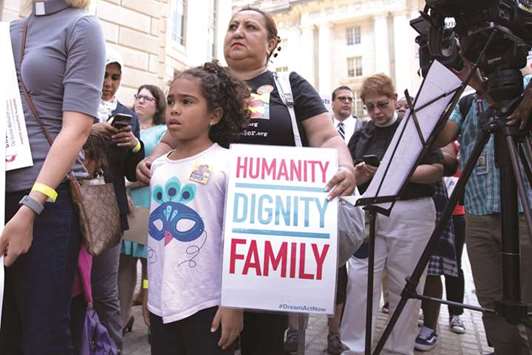With the sound of a young child crying in the background, the top Democrat on the House of Representatives Judiciary Committee, Jerrold Nadler, broke from traditional protocol and started reading from a statement, saying “these children are not animals.”
His Republican colleagues tried to shout over him “Out of order!”
Nadler’s comments at the hearing, which was meant to be about the FBI’s handling of a probe into Hillary Clinton’s e-mails, were followed by protests from the audience, as women with young children stood and shouted “Families belong together!” before they were escorted out by the Capitol Police.
The family separations at the southern US border, highlighted by videos of youngsters detained in cages and an audiotape of wailing children, have sparked an outcry at home and strong condemnation abroad.
President Donald Trump, who has made a tough stance on immigration a centrepiece of his presidency, has steadfastly defended his administration’s actions.
He has cast blame for the separations on Democrats, although his fellow Republicans control both chambers in Congress and his own administration implemented the current policy of strict adherence to immigration laws.
Congressman Elijah Cummings, the top Democrat on the House Oversight Committee, broke from his prepared remarks at yesterday’s hearing to blast what he called a policy of putting children into “internment camps,” and called on Republicans to stand up against the president.
“We should be able to agree that we will not keep kids in child internment camps indefinitely and hidden away from public view. What country is that? This is the United States of America!,” said Cummings, who was visibly emotional as his voice grew louder.
Trump plans to meet Republican lawmakers before votes expected this week on immigration legislation.
The president has sought to link an end to the family separations to passage of a wider bill on immigration, prompting Democrats to accuse him of using children as hostages.
“Mr Chairman, we need you. Those children need you,” Cummings said.
“I am talking directly to my Republican colleagues. We need you to stand up to President Trump. We need you to join us in telling him that we reject this mean policy.”
The separations, which have been blasted by Democrats, some Republicans, medical professionals, rights activists and clergy, began after US Attorney General Jeff Sessions announced a “zero tolerance” policy in April in which all those apprehended entering the United States illegally would be criminally charged.
Parents who are referred by border agents for prosecution are held in federal jails, while their children are moved into detention facilities under the custody of the Office of Refugee Resettlement (ORR), a division of the Department of Health and Human Services.
Nearly 2,000 children were separated from their parents between mid-April and the end of May.
Yesterday’s disrupted hearing was the second this week convened to look into the conclusions of a report released last week by Justice Department Inspector General Michael Horowitz on the FBI’s handling of a probe into Clinton’s use of a private email server while she was secretary of state.
Criticism of the treatment of the children has intensified in recent days.
The attorneys general of 21 states yesterday called on Sessions in a letter to stop endangering children by separating them from their families.
“Put simply, the deliberate separation of children and their parents who seek lawful asylum in America is wrong. This practice is contrary to American values and must be stopped,” said Hector Balderas, the attorney general in the border state of New Mexico.
Online videos showed immigrant children being held in concrete-floored cages at detention centres.
In an audio recording obtained by ProPublica investigative news site, which was widely circulated online and in US media, children said to be in a detention facility could be heard crying and calling for their parents.
Reuters could not independently verify the authenticity of the tape.
In the latest condemnation from abroad, the UN refugee agency has told Washington it is very concerned over the family separations, UN High Commissioner for Refugees Filippo Grandi told Reuters.
France’s government spokesman called images of the children “shocking” and said of the policy that Europe and the United States did not share the same values.
The uproar over the family separations appeared unlikely to facilitate a big immigration overhaul in Congress that would finally resolve deep national divisions over the issue.
Trump is focused on winning congressional funding for a wall he has long wanted to build along America’s southern border with Mexico, and Democrats have long said they will resist that.
In their evening meeting, Trump and House Republicans were expected to discuss two bills scheduled for votes tomorrow. Both were drafted with no input from Democrats.
One bill would limit, but not fully prohibit family separations, fund Trump’s wall and give legal protections to young adults, known as “Dreamers,” who were brought to the country as children when their parents entered the country illegally.
Details were still in flux.
The bill is opposed by Democrats, who object to another provision that would cut legal immigration levels, and by conservative Republicans who are backing a rival bill that takes a harder line on immigration.
In the Senate, Republican Senator Ted Cruz, who ran unsuccessfully against Trump in 2016 for their party’s presidential nomination, said he would introduce legislation this week to halt family separations.
Cruz said his bill would build temporary shelters where immigrant families could stay together in cases where there was no threat to the children’s safety, double the number of federal immigration judges and speed handling of asylum applications.
Border crossings briefly dropped after Trump took office in January 2017, but have since risen to levels seen during the administration of his Democratic predecessor, Barack Obama.
Almost 52,000 people were caught trying to cross the southern border illegally in May, according to government figures.

